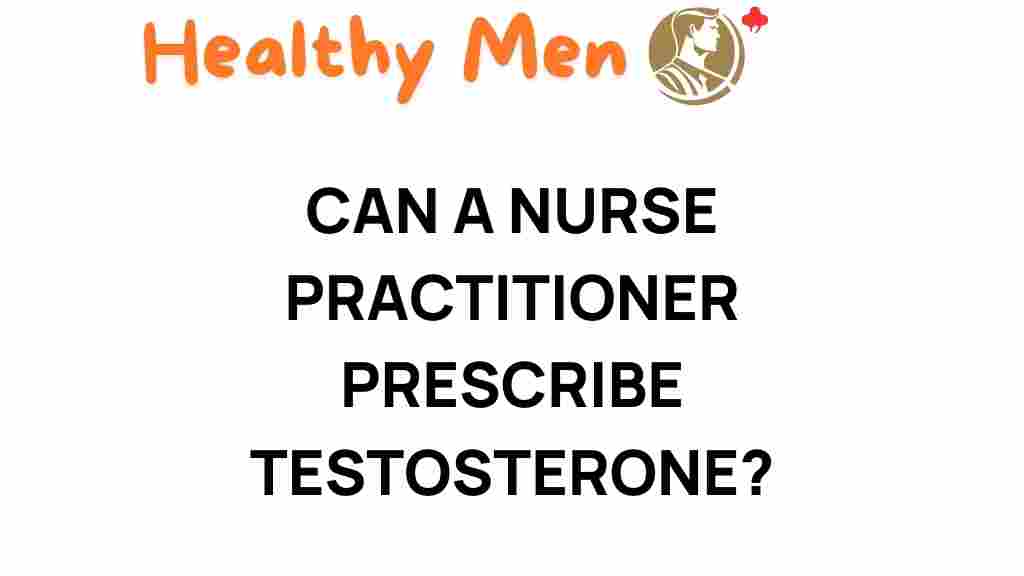Can a Nurse Practitioner Prescribe Testosterone? Understanding Prescription Authority
The role of nurse practitioners (NPs) in healthcare has expanded significantly over the years, leading to questions about their authority to prescribe certain medications, including testosterone. This article aims to unpack the controversy surrounding the prescription authority of nurse practitioners, particularly in the context of hormone therapy and testosterone prescriptions. As healthcare regulations evolve, it is crucial to understand how these changes impact patient care and the responsibilities of medical professionals.
Understanding Nurse Practitioners and Their Role
Nurse practitioners are advanced practice registered nurses who possess the education and clinical training to provide a wide range of healthcare services. They can diagnose conditions, develop treatment plans, and, in many cases, prescribe medications. The ability of NPs to prescribe testosterone varies widely depending on state regulations and healthcare settings.
- Education: NPs typically hold a master’s or doctoral degree in nursing.
- Certification: They must pass national certification exams to practice in their specialty area.
- Clinical Experience: NPs complete extensive clinical training before they can independently provide care.
The Controversy Surrounding Testosterone Prescriptions
The prescription of testosterone by nurse practitioners has become a contentious issue due to various factors:
- Hormone Therapy Awareness: Increasing awareness about hormone therapy has led many patients to seek testosterone treatments, raising questions about who can provide such therapies.
- Regulatory Variability: Each state has different regulations governing the scope of practice for nurse practitioners, impacting their ability to prescribe testosterone.
- Patient Safety Concerns: Critics argue that NPs may lack the necessary training to manage complex hormone therapies safely.
Healthcare Regulations Impacting Prescription Authority
Healthcare regulations play a significant role in determining whether nurse practitioners can prescribe testosterone. Here’s a closer look at how these regulations vary:
State Regulations
Each state in the U.S. has its own laws regarding the prescription authority of nurse practitioners. Some states grant full practice authority, allowing NPs to prescribe medications, including testosterone, without physician oversight. Others require a collaborative agreement with a physician, and some restrict NPs from prescribing certain controlled substances altogether.
- Full Practice States: NPs can evaluate patients, make diagnoses, interpret diagnostic tests, and initiate treatment plans independently.
- Reduced Practice States: NPs must collaborate with a physician to provide certain services, including prescribing testosterone.
- Restricted Practice States: NPs have a limited scope of practice and require direct supervision or a supervisory agreement with a physician.
Professional Guidelines and Training
Beyond state regulations, professional organizations such as the American Association of Nurse Practitioners (AANP) provide guidelines that influence NP practices. These guidelines emphasize the importance of training and continuing education in hormone therapy management.
Many nurse practitioners undergo additional training in hormone replacement therapy, which can enhance their competency in prescribing testosterone safely and effectively. This training often includes:
- Understanding hormone physiology and metabolism.
- Assessing patients for testosterone deficiency.
- Monitoring therapy and managing side effects.
Step-by-Step Process for NPs Prescribing Testosterone
For nurse practitioners who are authorized to prescribe testosterone, there is a systematic approach that should be followed to ensure optimal patient care:
1. Patient Assessment
The first step is to conduct a comprehensive assessment of the patient. This includes:
- Reviewing the patient’s medical history.
- Conducting a physical examination.
- Ordering laboratory tests to measure testosterone levels.
2. Diagnosis
Based on the assessment, the NP must determine whether the patient has a testosterone deficiency or related condition. Common diagnoses include:
- Hypogonadism.
- Androgen deficiency.
- Other hormonal imbalances.
3. Treatment Plan
If testosterone therapy is indicated, the NP will develop a treatment plan that may include:
- Choosing the appropriate formulation (injections, gels, patches).
- Discussing potential benefits and risks with the patient.
- Setting up a monitoring schedule for follow-up appointments and lab tests.
4. Monitoring and Follow-Up
Regular monitoring is crucial to assess the effectiveness of therapy and manage any side effects. NPs should:
- Schedule follow-up visits to evaluate patient progress.
- Order periodic blood tests to check testosterone levels and other related parameters.
- Adjust the treatment plan as needed based on the patient’s response.
Troubleshooting Common Challenges
While many nurse practitioners successfully manage testosterone therapy, challenges can arise. Here are some common issues and tips for troubleshooting:
1. Patient Resistance
Some patients may be hesitant to start hormone therapy. To address this:
- Provide education on the benefits and risks of testosterone therapy.
- Share success stories and testimonials from other patients.
- Encourage open dialogue to address any concerns.
2. Managing Side Effects
Testosterone therapy can lead to side effects such as acne, mood swings, and increased red blood cell counts. To manage these:
- Educate patients about potential side effects and when to seek help.
- Monitor lab results closely to catch issues early.
- Adjust dosages or change formulations if necessary.
Insurance coverage for testosterone therapy can vary widely. To help patients:
- Assist with prior authorization processes as needed.
- Stay informed about insurance policies and coverage changes.
- Provide alternative options if coverage is denied.
Conclusion: The Future of Nurse Practitioners and Testosterone Prescriptions
The ability of nurse practitioners to prescribe testosterone is a complex issue influenced by state regulations, professional guidelines, and patient care considerations. As healthcare continues to evolve, the role of NPs in hormone therapy is likely to expand, provided they have the appropriate training and support.
For patients seeking testosterone therapy, collaborating with an experienced nurse practitioner can lead to improved health outcomes and a better understanding of hormone management. As always, it is essential to consult with qualified medical professionals who can provide personalized care tailored to individual needs.
For more information on the role of nurse practitioners in hormone therapy, check out this link. To learn about testosterone therapy options, visit the Hormone Health Network for credible resources.
This article is in the category Conditions and created by healthymen Team
